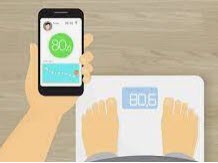There are many apps for assisting people in losing weight and making holistic lifestyle changes. These weight loss apps provide motivation, discipline, and accountability needed to lose weight and maintain loss. The features include counting calories, logging meals, or tracking workouts. A website will also accompany most apps; therefore, providing flexibility for those who do not have a mobile device.
Noom and Weight Watchers are the most commonly known apps in the industry. Both offer similar features such as individual coaches, self-assessments, syncing with smartwatches, and connecting with online communities or a buddy system. However, WW focuses on counting and banking points, and lifestyle changes such as sleep patterns, online workout videos, and mental health. Whereas Noom takes a cognitive approach teaching about nutrition and the reason for wanting to lose weight.
Weight loss becomes a hot topic around the new year. The following article provides an extensive comparison of the apps:
Noom vs. Weight Watchers: Which weight loss app is better for New Year’s goals?
Short videos on apps’ features:
How to use the WW App – Search and track foods
What is Noom?

After reading this thread, watching the videos and researching like trends, it seems obvious that for people trying to lose weight, these Apps place an awful lot of value and time on thinking about food. Wouldn’t this be akin to dangling a constant carrot of temptation ?(…except the carrot is a cream cheese, hot fudge, salted caramel , ice cream donut…) Mobile technology for weight loss seems to have gamified the ancient daily activity of eating through the use of “counting calories, logging meals, or tracking workouts,” as cited above. What if aspects of nature, respect for life and intentional mindfulness were introduced in place of rewards, points, and AI recommendations? A new generation of people may have been more deeply motivated by the possibility of imaginative play than the resultant return to a healthy, stealthy state of original health and well-being. The changing nature of work, which used to consist of much more physical labor, is no longer a source of kinesthetic movement for digital workers. What can be derived from a populace who cares more about CPU than BMI? How can intentionally mindful movement be better integrated into a personalized App to deepen the aim of weight loss as a lifestyle, rather than a cyclical syndrome?
I’m quite wary of food-tracking apps such as these. I think these apps have positive intentions, but can actually guide people toward negative cognitions surrounding food and potentially give poor nutritional advice. For instance, many weight loss apps set 1,200 calories as a default daily goal for weight loss – however nutritionists have long critiqued this number as being insufficient for women at nearly any age. Healthline identifies average caloric intake needs for women in their 20’s as roughly 2200 cal/day for maintenance or roughly 1700 cal/day for weight loss (https://www.healthline.com/nutrition/how-many-calories-per-day#average-calorie-needs). To compound this, there are many individuals on social media who talk about the ways in which the calorie-tracking mechanism employed by such apps and low daily targets has led to the development of disordered eating habits and an obsession with calorie tracking over building a more positive relationship with, and habits toward, health, fitness, and diet. And though academic studies on the effectiveness of such apps are few, one study from Penn State actually showed that users of MyFitnessPal (a similar, but older app) lost less weight over a two-year period than even the control group (https://sites.psu.edu/siowfa16/2016/10/19/do-weight-loss-apps-really-help-people-lose-weight/).
Hi Analesa,
I also think gyms can be intimidating for some people. And that weight loss is a personal journey. But you are right the pandemic has changed the fitness industry. While those facilities are limited in hours and services some people are hesitant about returning. And these apps are offering a lot of support that would be available in gyms. For example weight watchers offers workout videos. The pandemic has changed people’s approach to weight loss. They turn to using weight apps and exercise apps for tracking activities. Plus communities are established.
These are definitely on the rise more than ever, especially with the pandemic and and everyone trying to live a healthier lifestyle. With many fitness centres being closed or at limited use during different stages of the pandemic, many people have turned to home fitness. Considering that discipline and habit-forming can be common barriers to maintaining a healthy lifestyle, nutrition and fitness apps have the potential to be effective supports. Similar to paying for a fitness membership motivating people to keep “using” the product they are paying for, paying for an app may also motivate people to stay consistent with home nutrition and fitness. In the “age of the screen”, many people respond to what their technology is telling them to do, sometimes more so than a qualified human.